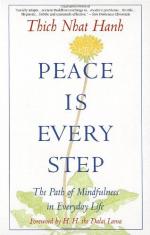
|
| Name: _________________________ | Period: ___________________ |
This test consists of 15 multiple choice questions and 5 short answer questions.
Multiple Choice Questions
1. What reason does Hanh give for the abuse of children at their own parents' hands?
(a) The child misunderstood discipline for abuse.
(b) The parents were only disciplining the child.
(c) The parents themselves were abused.
(d) The parents were not living in mindfulness.
2. In "Mindfulness Must Be Engaged", what does Hanh remind readers of concerning the extension of mindful living from one person to the world?
(a) Mindful living is intended to create peace for one individual.
(b) Mindful living is a tool that must be actively used.
(c) Mindful living needs to reach only a few to have an effect on many.
(d) Mindful living will naturally flow to the masses.
3. How many years does it take for nuclear waste to become a flower?
(a) One half of a million.
(b) Infinitely many.
(c) One quarter of a million.
(d) One million.
4. What can happen when one observes parents with compassion?
(a) One can understand the wrongs of the parents.
(b) One can avoid repeating the cycle.
(c) One can forgive them their wrongs.
(d) One finds joy and peace.
5. What must be one's approach towards nature for survival?
(a) Curiosity.
(b) Non-duality.
(c) Honor.
(d) Awe.
6. Which river, supposedly, contains enough chemicals to develop photographs?
(a) The Nile River.
(b) The Charles River.
(c) The Mississippi River.
(d) The Rhine River.
7. What is Hanh's definition of compassion?
(a) The ability to remove suffering from another person.
(b) Understanding why another is suffering.
(c) Offering to help in another's suffering.
(d) Feeling the intensity of another's suffering.
8. Which of these is NOT a component for the extension of mindful living into the world?
(a) Awareness.
(b) Conscious breathing.
(c) Smiling.
(d) Courage.
9. Which group of people are "the light at the top of the candle" for interbeing?
(a) Elderly.
(b) Veterans.
(c) The Enlightened.
(d) Children.
10. What do negative feelings leave behind if they are not faced?
(a) Relief, acceptance, and peace.
(b) Positive acceptance.
(c) Destructive feelings, thoughts, and behaviors.
(d) Negativity.
11. In "Transforming Feelings", who/what is analogous to emotion?
(a) Buddha.
(b) The crying child.
(c) Mindfulness.
(d) The mother.
12. According to Hanh, what can break the "cycle of transmission"?
(a) Intense therapy.
(b) Buddhism.
(c) Mindful living.
(d) Wisdom of our elders.
13. At the beginning of Chapter 51, Hanh introduces the word interbeing. What is the meaning of this word?
(a) All things are sacred.
(b) All things are sources of energy.
(c) All things are connected.
(d) All things exist in harmony.
14. In the story "Look into Your Hand", who told the young man to look at his hand?
(a) Buddha.
(b) His grandmother.
(c) His father.
(d) His mother.
15. Which of these dissolves anger?
(a) Understanding.
(b) Love.
(c) Faith.
(d) Compassion.
Short Answer Questions
1. According to Hanh, what is the only tool useful in changing a situation?
2. In "Transforming Feelings", who/what symbolizes mindfulness?
3. In which river did the author wash his face?
4. What is Hanh's attitude towards the Western cultures' treatment of parents?
5. What are most individuals unwilling to do about an issue?
|
This section contains 509 words (approx. 2 pages at 300 words per page) |

|




